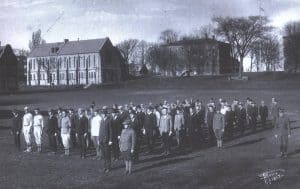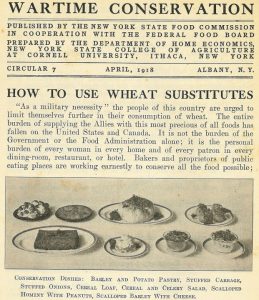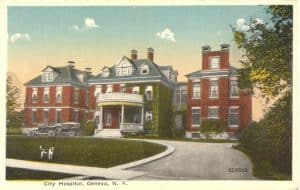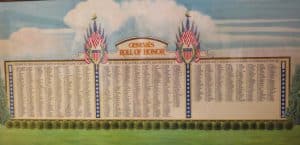Alice Seward and World War I, Part Three
By John Marks, Curator of Collections
In a rush of holiday fervor I forgot about Alice Seward’s diary. If you’re just joining us, you can find Part One in October 2018 and Part Two in November. We pick up the story in the late summer of 1918.
 “All of our Colleges are turned into military training schools. Our little Hobart is being prepared to receive two hundred men under the regime of the War Department’s Student’s Army Training Corps. The men will be housed, clothed and fed in the college buildings. Coxe Hall will be used as a Mess Hall with the Dean’s office for kitchen.”
“All of our Colleges are turned into military training schools. Our little Hobart is being prepared to receive two hundred men under the regime of the War Department’s Student’s Army Training Corps. The men will be housed, clothed and fed in the college buildings. Coxe Hall will be used as a Mess Hall with the Dean’s office for kitchen.”

While conservation was suggested during the war, fuel restrictions were mandatory. Heatless days – most building boilers ran on coal – conserved tons of fuel. The savings went to steamships carrying war supplies. Gasoline rationing was the next step.
“Sunday, October 14th, 1918. War Day 1,528.
Certainly no one ever expected to meet with the conditions of this day. It is the seventh gasoleneless [sic] Sunday and we are promised it shall be the last. A new method of conserving has been proposed, but not yet given to the world. Only a few Fords with Army supplies and some cars placarded Necessary Business have passed our gates today. It is stated that a million barrels of oil have been saved by this method of conservation.”
By the fall of 1918 the flu pandemic reached Geneva. Nations involved in the war suppressed information about the outbreak to maintain morale. Spain was the only large country not in the war; their publicity led the public to think of the illness as the Spanish Flu.

City Hospital, Geneva
“[no date] On account of the spread of Spanish Influenza all theatres, movies, and schools have already been closed, and today no church services have been held. It is the first Sunday of my life in which I have not heard the bells….The majority of [Geneva’s 1,000 cases] were among the very poor and were induced by crowded quarters and unsanitary conditions. The Hospital was more than full, and for lack of nurses our young women came nobly to the front, and I heard of Hester Rose, Mollie Wells, Isabella Burrall, Lilian Endicott and others, Red Cross Nurses Aids, taking their turn at washing dishes, carrying trays, answering bells and doing what they could to help the patients. We have had broth, jelly, custards, etc. made in our homes and carried to the sick poor. It was a relief when the end came and we could lead a normal life.”
“[no date] Running out diagonally from the north side of the Armory on Main Street, Geneva, has been erected an Honor Roll. On a tall paneled screen decorated on top by two groups of draped flags are places for the names of 1300 men and women who have gone to the front from our town. Suggestions for an inscription to be placed under the flags were requested by a committee selected by the Mayor. The one chosen was written by Professor Herbert H. Yeames of Hobart College and reads: ‘To her gallant sons who have gone forth to fight for Justice, Liberty and Democracy Geneva gives honor and enduring remembrance.’ It is altogether a suggestive and adequate memorial.”
“Nov. 7th, 1918. A most exciting day! At 2:30 p.m. Miss Lillie Hopkins telephoned that a report had reached us that Germany had signed the terms of an armistice and had surrendered unconditionally. This was unofficial…a few minutes later off went every church bell, whistle and other noise producing thing in town.”
Alice and Lillian drove downtown to see the celebration. Men with a large flag paraded on South Main Street. Alice wrote, “Standing in her doorway and bravely watching them pass was Mrs. Henry Slosson, who had received only three days before the yet unconfirmed news of the death in action of her son James.”
“Nov. 11th, 1918. Another glorious day, and the real thing this time. The authentic news that Germany had agreed to the terms of the Armistice reached Geneva at 4:30 this morning. The first report came over the wires of the Lehigh Valley Railway, and forthwith a locomotive made the proclamation in a shrill and continuous blast.”
There was no sleep after that. At 8 am the mayor called for a general parade in the afternoon. Fraternal groups, military companies, and war workers turned out with flags, wreaths, and hastily-made floats.
Alice continued her journal through 1921, but here we will end her story.
